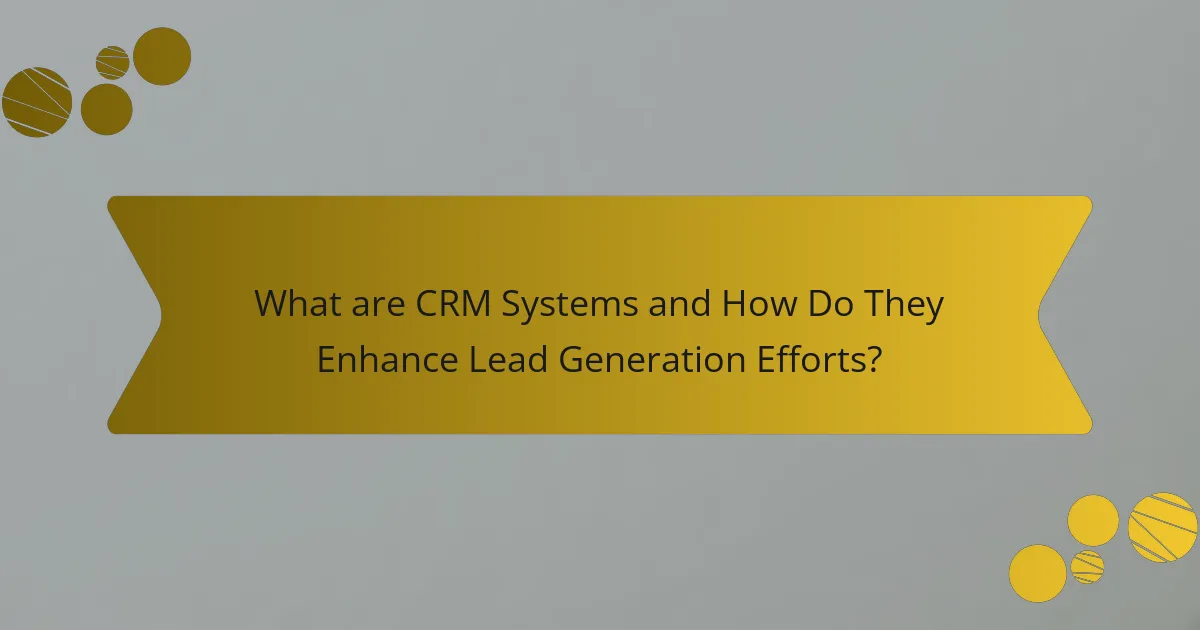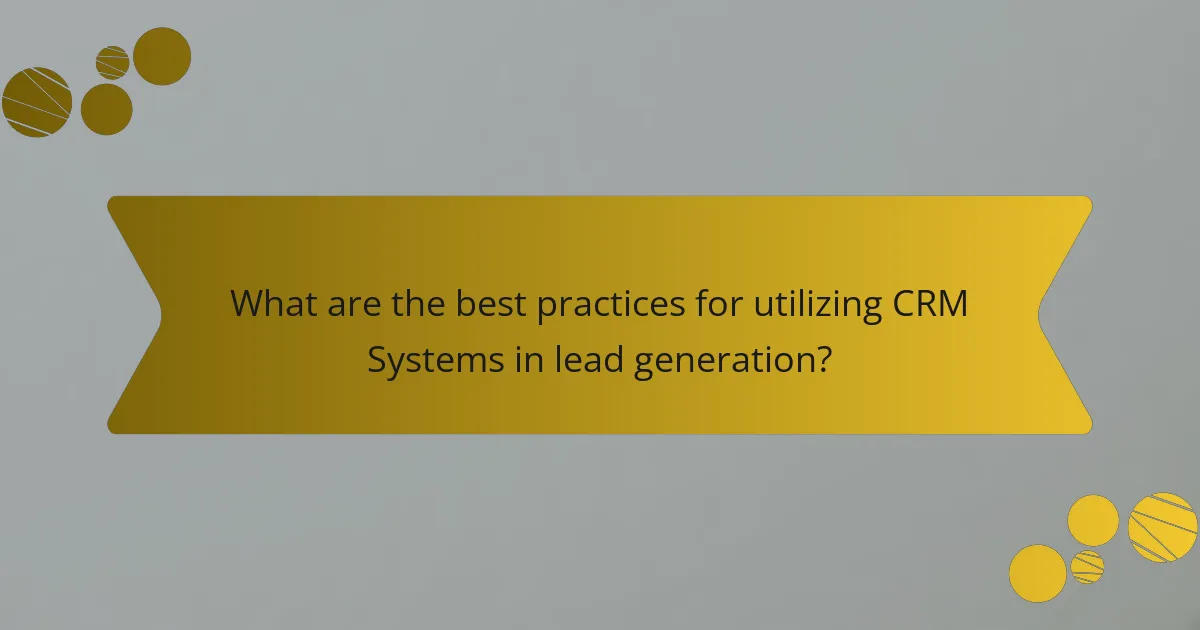CRM systems are software tools designed to help businesses manage customer relationships and interactions, significantly enhancing lead generation efforts. By centralizing customer data, including contact information and past interactions, these systems improve the efficiency of sales teams in identifying and tracking potential leads. Automation of communication and follow-ups ensures timely engagement, while analytics features provide insights into lead sources and conversion rates. Best practices for utilizing CRM in lead generation include effective lead segmentation, regular updates of lead information, and integration with marketing tools, all aimed at maximizing sales productivity and improving overall sales performance.

What are CRM Systems and How Do They Enhance Lead Generation Efforts?
CRM systems are software tools that help businesses manage customer relationships and interactions. They enhance lead generation efforts by organizing and analyzing customer data. This data includes contact information, preferences, and past interactions. By centralizing information, CRM systems enable sales teams to identify potential leads more effectively.
Additionally, these systems automate communication and follow-ups, ensuring timely engagement with prospects. According to a study by Nucleus Research, CRM systems can increase sales productivity by 14%. This boost in efficiency directly correlates with improved lead generation outcomes. Furthermore, CRM tools often include analytics features that track lead sources and conversion rates. This insight allows businesses to refine their marketing strategies and target the most effective channels.
How do CRM Systems function in a business environment?
CRM systems function by collecting and managing customer data to improve relations and sales. They centralize information from various sources, such as emails, social media, and sales interactions. This data helps businesses track customer interactions and preferences. CRM systems automate tasks like follow-ups and reporting, enhancing efficiency. They provide analytics to identify trends and opportunities. By segmenting customers, businesses can tailor marketing efforts effectively. This targeted approach increases lead generation and conversion rates. Studies show that companies using CRM see an increase in sales productivity by 34%.
What key features of CRM Systems contribute to lead generation?
Key features of CRM systems that contribute to lead generation include lead tracking, automation, and analytics. Lead tracking allows businesses to monitor interactions with potential customers. This feature ensures that no leads are overlooked and helps prioritize follow-ups. Automation streamlines repetitive tasks like email marketing and follow-up reminders. This efficiency saves time and increases the likelihood of converting leads. Analytics provides insights into lead behavior and campaign effectiveness. By analyzing this data, businesses can refine their strategies and improve targeting. These features work together to enhance lead generation efforts significantly.
How do CRM Systems manage customer data effectively?
CRM systems manage customer data effectively by centralizing information in a single database. This allows for easy access and updates to customer profiles. The systems automate data entry, reducing errors and saving time. They also segment customer data for targeted marketing efforts. Analytics tools within CRM systems provide insights into customer behavior. This enables businesses to tailor their strategies accordingly. Additionally, CRM systems facilitate communication across departments, ensuring consistent customer interactions. Studies show that companies using CRM systems can increase sales by up to 29%.
Why is lead generation important for businesses?
Lead generation is crucial for businesses because it directly impacts revenue growth. Effective lead generation strategies create a steady stream of potential customers. This increases the likelihood of converting leads into sales. According to HubSpot, 61% of marketers say generating traffic and leads is their top challenge. Additionally, businesses that prioritize lead generation see a 133% increase in their chances of achieving their revenue goals. By identifying and nurturing leads, companies can build lasting customer relationships. Ultimately, lead generation is essential for maintaining competitiveness in the market.
What role does lead generation play in sales growth?
Lead generation is crucial for sales growth as it directly influences the number of potential customers. Effective lead generation identifies and attracts prospects who may be interested in a product or service. This process increases the sales pipeline, providing more opportunities for conversion. According to HubSpot, companies that excel at lead generation see a 50% increase in sales-ready leads. Furthermore, a study by the Aberdeen Group found that businesses using lead generation strategies can achieve a 133% higher revenue growth than those that do not. Therefore, lead generation serves as the foundation for sustained sales growth by consistently feeding the sales team with qualified prospects.
How can effective lead generation strategies impact customer acquisition?
Effective lead generation strategies significantly enhance customer acquisition. These strategies identify potential customers and nurture them through targeted communication. By utilizing data-driven insights, businesses can tailor their messaging to meet specific customer needs. This personalization increases engagement and builds trust with prospects. Research shows that companies with effective lead generation processes see a 50% increase in sales-ready leads. Furthermore, effective lead generation can shorten the sales cycle by providing sales teams with qualified leads. Ultimately, this leads to higher conversion rates and increased revenue.

What are the benefits of utilizing CRM Systems for lead generation?
Utilizing CRM systems for lead generation enhances efficiency and organization. These systems centralize customer data, enabling better tracking of leads. They automate repetitive tasks, allowing sales teams to focus on closing deals. CRM systems provide insights through analytics, helping identify high-potential leads. They facilitate personalized communication, improving engagement rates. According to a study by Nucleus Research, CRM systems can increase sales productivity by 14%. This data underscores the effectiveness of CRM tools in optimizing lead generation efforts.
How can CRM Systems improve lead tracking and management?
CRM systems enhance lead tracking and management by centralizing data and automating processes. They provide a unified platform for storing and accessing lead information. This centralization improves data accuracy and reduces duplication. Automated tracking features allow for real-time updates on lead interactions. These updates help sales teams prioritize follow-ups effectively. CRM systems also enable detailed reporting and analytics. This data-driven approach helps identify trends and optimize strategies. According to a study by Nucleus Research, CRM systems can increase sales productivity by up to 34%. This statistic underscores the efficiency gains from improved lead management.
What tools within CRM Systems assist in tracking leads?
CRM systems utilize various tools to assist in tracking leads. These tools include lead scoring, which prioritizes leads based on their engagement and potential value. Another tool is the lead capture form, which collects information directly from potential customers. Automated follow-up reminders ensure timely communication with leads. Activity tracking logs interactions with leads, providing insights into their behavior. Reporting dashboards visualize lead data for better analysis. Integration with email marketing tools enables seamless communication. Lastly, analytics tools assess the effectiveness of lead generation strategies. These features collectively enhance lead management and conversion rates.
How does lead scoring work in CRM Systems?
Lead scoring in CRM systems assigns numerical values to leads based on their engagement and characteristics. This process helps prioritize leads for sales teams. CRM systems analyze data such as website interactions, email opens, and demographic information. Each interaction adds or subtracts points from a lead’s score. Higher scores indicate greater likelihood of conversion. Sales teams focus on leads with the highest scores. This targeted approach increases efficiency and conversion rates. Studies show that organizations using lead scoring see a 77% increase in ROI.
What advantages do CRM Systems offer in terms of customer relationship management?
CRM systems enhance customer relationship management by providing centralized data storage, improved communication, and streamlined processes. Centralized data storage allows businesses to access customer information easily, improving response times. Enhanced communication features facilitate timely interactions with customers, fostering stronger relationships. Streamlined processes automate routine tasks, freeing up time for more strategic activities. Additionally, CRM systems offer analytics tools that help identify customer trends and preferences. According to a study by Nucleus Research, CRM systems can increase sales productivity by up to 34%. This data highlights the tangible benefits of using CRM systems for effective customer relationship management.
How do CRM Systems facilitate personalized communication with leads?
CRM systems facilitate personalized communication with leads by centralizing customer data. They store detailed information about leads, including preferences and interactions. This data allows businesses to segment leads based on specific criteria. Personalized messages can then be crafted for each segment. For instance, CRM systems can automate tailored email campaigns. These campaigns can address individual interests and needs. Additionally, CRM systems track lead interactions, enabling timely follow-ups. According to a study by Nucleus Research, CRM systems can improve sales productivity by 14%. This demonstrates their effectiveness in enhancing communication and engagement with leads.
What impact do CRM Systems have on customer retention rates?
CRM systems significantly improve customer retention rates. They achieve this by enabling personalized communication and tailored marketing strategies. According to a study by Salesforce, organizations that effectively use CRM systems can increase customer retention by up to 27%. CRM systems also provide valuable insights into customer behavior and preferences. This data allows businesses to anticipate customer needs and enhance satisfaction. Furthermore, effective CRM implementation fosters stronger customer relationships. These relationships lead to increased loyalty and repeat purchases. Overall, CRM systems are essential tools for enhancing customer retention.

What are the best practices for utilizing CRM Systems in lead generation?
The best practices for utilizing CRM systems in lead generation include segmenting your leads effectively. This allows for targeted marketing efforts. Regularly updating lead information ensures accuracy and relevance. Automating follow-up tasks increases efficiency and reduces the chance of leads slipping through the cracks.
Integrating CRM with marketing tools enhances lead tracking and nurturing. Utilizing analytics within the CRM helps identify successful lead sources. Training staff on CRM usage maximizes its potential. Lastly, maintaining clear communication within teams fosters collaboration in lead management. These practices improve lead conversion rates and overall sales performance.
How can businesses effectively integrate CRM Systems into their lead generation strategies?
Businesses can effectively integrate CRM systems into their lead generation strategies by automating data collection and management. This allows for real-time tracking of leads and their interactions. By analyzing customer data, businesses can identify patterns and preferences. CRM systems enable personalized communication, increasing engagement rates. Implementing lead scoring features helps prioritize high-potential leads. Integration with marketing tools streamlines campaigns and improves targeting. According to a study by Nucleus Research, CRM systems can boost sales productivity by 14.6%. This demonstrates the effectiveness of CRM in enhancing lead generation efforts.
What steps should be taken to ensure successful CRM implementation?
To ensure successful CRM implementation, organizations should follow a structured approach. First, define clear objectives for the CRM system. This includes identifying specific goals such as improving customer relationships or increasing sales efficiency. Next, involve key stakeholders early in the process. Engaging users from sales, marketing, and customer service ensures the system meets their needs.
After that, select the right CRM software that aligns with the organization’s requirements. Research shows that 70% of CRM implementations fail due to poor software selection. Following software selection, develop a comprehensive implementation plan. This plan should include timelines, resource allocation, and training schedules.
Next, focus on data migration and integration. Accurate data transfer is crucial, as poor data quality can undermine CRM effectiveness. Finally, provide ongoing training and support. Continuous education helps users maximize the system’s potential, leading to higher adoption rates. These steps collectively contribute to a successful CRM implementation, enhancing lead generation efforts significantly.
How can businesses train their staff to maximize CRM usage?
Businesses can train their staff to maximize CRM usage through structured training programs. These programs should cover the CRM system’s features and functionalities. Hands-on workshops can enhance practical understanding. Regular refresher courses keep staff updated on new features. Providing access to online resources supports ongoing learning. Encouraging peer-to-peer knowledge sharing fosters a collaborative environment. Setting clear performance metrics helps assess CRM usage effectiveness. Research shows that companies with comprehensive training see a 20% increase in CRM adoption rates.
What common challenges do businesses face when using CRM Systems for lead generation?
Businesses face several common challenges when using CRM systems for lead generation. Data quality issues often arise, leading to inaccurate or outdated information. Poor integration with existing tools can hinder workflow efficiency. User adoption rates may be low, resulting in underutilization of the system. Complexity of features can overwhelm users, causing frustration. Additionally, insufficient training can lead to improper usage of the CRM. These challenges can ultimately affect the effectiveness of lead generation efforts.
How can businesses overcome data quality issues in CRM Systems?
Businesses can overcome data quality issues in CRM systems by implementing regular data cleansing processes. This involves identifying and correcting inaccuracies in customer data. Training staff on data entry best practices is essential to maintain high-quality data. Establishing data validation rules during input can prevent errors from occurring. Regular audits of the data can help identify inconsistencies and outdated information. Additionally, integrating CRM systems with other data sources can enhance data accuracy. A study by Gartner shows that organizations that prioritize data quality can improve decision-making by 70%.
What strategies can be employed to ensure user adoption of CRM Systems?
To ensure user adoption of CRM systems, organizations should implement comprehensive training programs. These programs should cater to different user skill levels. Providing hands-on training can enhance user confidence and competence. Additionally, offering ongoing support is crucial for addressing user queries. Incorporating user feedback into system improvements fosters a sense of ownership. Aligning CRM features with user needs increases relevance and usability. Regularly communicating the benefits of the CRM system reinforces its value. Research indicates that organizations with structured adoption strategies see a 30% increase in user engagement.
What practical tips can enhance the effectiveness of CRM Systems in lead generation?
Utilizing CRM systems effectively can significantly enhance lead generation. First, ensure data quality by regularly cleaning and updating your contact lists. Accurate data leads to better targeting and higher conversion rates. Second, segment your leads based on demographics and behavior. This allows for personalized communication, which increases engagement. Third, automate follow-up tasks to ensure timely responses. Automation can improve efficiency and reduce the risk of leads falling through the cracks. Fourth, integrate your CRM with other marketing tools. This creates a seamless flow of information and enhances overall strategy. Lastly, analyze performance metrics regularly to identify trends and areas for improvement. Data-driven decisions can lead to more effective lead generation strategies.
CRM systems are software tools designed to manage customer relationships and enhance lead generation efforts. This article explores how CRM systems centralize customer data, automate communication, and provide analytics to improve sales productivity and lead tracking. It highlights key features such as lead scoring, automation, and personalized communication that contribute to effective lead management. Additionally, the article addresses the importance of lead generation for business growth and outlines best practices for integrating CRM systems into lead generation strategies. Common challenges and practical tips for maximizing CRM effectiveness are also discussed.
